
|
The Word Has Been Abroad: A Guide Through Balthasar's Aesthetics, by Aidan Nichols.
Catholic University of America Press (June 1998)
Awarded the prestigious Paul VI Prize for theology and designated a Cardinal just before his death in 1988 by Pope John Paul II, Balthasar's writings have clearly helped to shape the theological style of the Catechism of the Catholic Church. His seven-volume series The Glory of the Lord provides a rich and complex theological aesthetics approaching God (unusually) through the transcendental attribute of Beauty (Glory) rather than directly through Truth or Goodness, and drawing not only upon theology but upon the entire breadth of the European literary and religious tradition-ancient, mediaeval, modern, and postmodern.
Understandably, The Glory of the Lord in its very extent and range is difficult to assimilate. In "The Word Has Been Abroad," Aidan Nichols, one of Britain's most accomplished and lucid theological writers, succeeds in summarizing the essential theological content of Balthasar's monumental work, against the background of the living Christian tradition to which it bears such impressive witness. In this way, Father Nichols has provided a much-needed key to understanding one of the most difficult but important writers of our time.
Excerpts
-
Contents, Preface & Introduction
Chapter 1: "The Face of Beauty"
|

|
No Bloodless Myth: A Guide through Balthasar's Dramatics, by Fr. Aidan Nichols.
Catholic University of America Press (March 2000)
Reviews
-
Review, by Edward T. Oakes. Times Literary Supplement. April 3, 2001.
Review, by David Moss. New Blackfriars March 5, 2003.
Excerpts
-
Contents & Preface
Chapter 1: "Transition from Aesthetics"
Chapter 2: "Rationale for Aesthetics"
|

|
Say It Is Pentecost: A Guide through Balthasar's Logic, by Aidan Nichols.
Catholic University of America Press (March 2001)
This book offers a comprehensive summary and interpretation of Balthasar’s logic. Nichols also considers the way in which the early volume "The Truth of the World" points forward to the theological aesthetics and dramatics and also how "Theo-Logic’s" concluding volumes pick up the themes of "The Glory of the Lord" and "Theo-Drama." He looks particularly at how Balthasar relates revelation of divine beauty and divine goodness to the unfolding of divine truth. The book concludes with a retrospective review of the trilogy as a whole.
Excerpts
-
Contents and Preface
Chapter 1: "Introducing Balthasar's Logic"
Chapter 27: "Epilogue to the Trilogy"
Reviews:
-
The Logic of Revelation. Review by John-Peter Pham. Crisis October 2001.
|
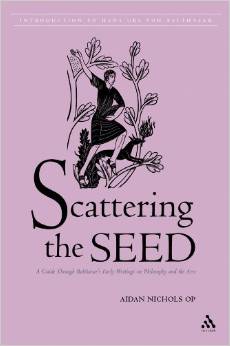
|
Scattering the Seed: A Guide Through Balthasar's Early Writings on Philosophy And the Arts, by Aidan Nichols.
T. & T. Clark Publishers, Ltd. (September 26, 2006)
Aidan Nichols's newest book in his ongoing Introduction to Hans Urs Von Balthasar series investigates Balthasar's early explorations of music and the other arts, before launching into a ramifying but controlled survey of his—often highly original—interpretations of major philosophers and literary figures in the European tradition from the early modern period until the 1930s.
Balthasar seeks to discover elements of truth, goodness, and beauty in a rich range of figures. He gives special attention to classical German philosophers (such as Fichte, Schelling, Hegel, and Nietzsche), as well as to dramatists and novelists (notably Goethe, Schiller, and Dostoevsky), and to intellectual giants of his own century (such as Bergson, Scheler, and Barth). He also intends to prove that writers who had lost a living contact with the biblical revelation carried by Christianity were incapable of reconstituting a synthesis of ideas about the goal of man and the universe, an accomplishment that could be taken for granted in the high medieval epoch. At the same time, the modern writers whom Balthasar investigates add, in his view, crucial enhancements of human understanding—particularly in relation to history and the human subject—which must be factored into any new overall vision of the future of the human soul and indeed the human species in its cosmic environment.
|
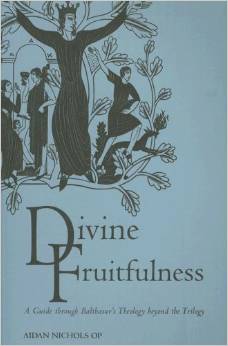
|
Divine Fruitfulness: A Guide to Balthasar's Theology Beyond the Trilogy, by Aidan Nichols.
Catholic University of America Press (February 28, 2007)
This fifth and final book in Aidan Nichols's Introduction to Hans Urs von Balthasar series covers Balthasar's prodigious output from the 1940s to his death in 1988, leaving aside the great multi-volume trilogy. Nichols identifies Balthasar's most significant sources, including the Church Fathers (especially Origen, Gregory of Nyssa, Maximus the Confessor, and Augustine), Henri de Lubac, Karl Barth, and Adrienne von Speyr. He then guides the reader through Balthasar's works thematically, covering fundamental theological themes (revelation and theology, divine providence, the paschal mystery), Mary and the church, the saints, prayer and mysticism, and Christian literature. Readers familiar with Balthasar's corpus will immediately recognize the major works on which Nichols draws. Throughout, Nichols calls attention to the way in which these writings fill out and complete the trilogy.
|

|
The Cambridge Companion to Hans Urs von Balthasar, edited by Edward T. Oakes, S. J., David Moss.
Cambridge University Press (September 13, 2004)
Reviews:
-
Briefly Noted. First Things 150 (February 2005).
|

|
Christology from Within: Spirituality and the Incarnation in Hans Urs von Balthasar, by Mark A. McIntosh.
Univ of Notre Dame Pr (September 1996).
Reviews:
-
Briefly Noted, by Edward T. Oakes, S.J. First Things 73 (May 1997).
|
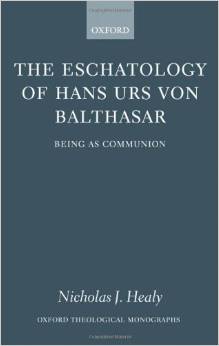
|
The Eschatology of Hans Urs von Balthasar: Being As Communion (Oxford Theological Monographs), by Nicholas J. Healy.
Oxford University Press, USA (July 15, 2005)
The unifying centre of Nicholas J. Healy's book is an analysis, in dialogue with the metaphysics of Thomas Aquinas, of Balthasar's understanding of the analogy of being. This discussion of analogy is framed by an interpretation of Balthasar's trinitarian eschatology. Healy shows that the ultimate form of the end, and thus the measure of all that is meant by eschatology, is given in Christ's eucharistic and pneumatic gift of himself - a gift that simultaneously lays bare the mystery of God's trinitarian life and enables Christ to 'return' to the Father in communion with the whole of creation.
|

|
The Ethical Thought of Hans Urs von Balthasar, by Christopher W. Steck.
Herder & Herder (December 2001)
|
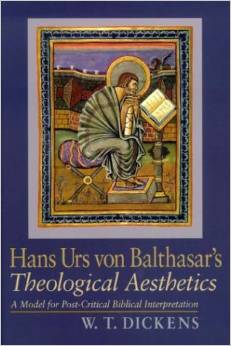
|
Hans Urs Von Balthasar's Theological Aesthetics: A Model for Post-Critical Biblical Interpretation, by William T. Dickens.
University of Notre Dame Press (November 2003)
|
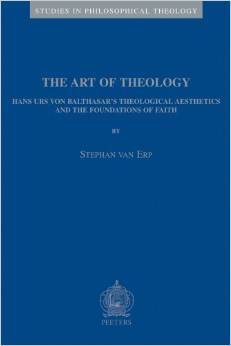
|
Hans Urs Von Balthasar's Theological Aesthetics and the Foundations of Faith (Studies in Philosophical Theology, 25), by Stephan Van Erp.
Peeters (April 2004)
The twentieth century Swiss theologian Hans Urs von Balthasar (1905-1988) wrote a seven volume masterpiece on theological aesthetics. He restructured theology around basic aesthetic concepts like form and beauty. The present study offers a critical analysis of Balthasar's work against the background of contemporary debates on theological foundations. The author approaches this task through a careful rereading of two of Balthasar's key sources: Nicholas of Cusa and Friedrich Wilhelm Joseph Schelling. In this way the author rediscovers hidden undercurrents in modernity from Renaissance aesthetics to German Idealism. The result is a theological aesthetics rooted in tradition and capable of understanding and communicating faith in the face of present day challenges.
|
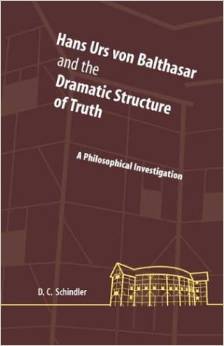
|
Hans Urs von Balthasar and the Dramatic Structure of Truth: A Philosophical Investigation, by David Schindler.
Fordham University Press (August 9, 2004)
Hans Urs von Balthasar (1905Ð1988) was one of the most prolific and influential theologians of the twentieth century. This book, the first English-language study of Balthasar, seeks to show the fruitfulness of his thought by drawing out its philosophical implications for the question of truth.D. C. Schindler argues that a "dramatic" approach, shaping both the form and content of philosophy, enables a new conception of being, of human consciousness, and of their coming together to satisfy both traditional concerns about unity and postmodern calls for difference-while avoiding the pitfalls of a one-sided emphasis on either.
|
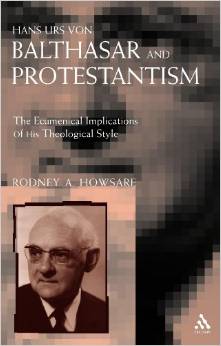
|
Hans Urs Von Balthasar And Protestantism: The Ecumenical Implications of His Theological Style , by Rodney Howsare.
T. & T. Clark Publishers (September 30, 2005).
|
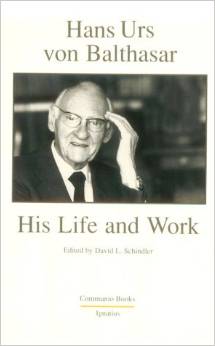
|
Hans Urs Von Balthasar: His Life and Work, edited by David Schindler.
Ignatius Press (October 1991)
|
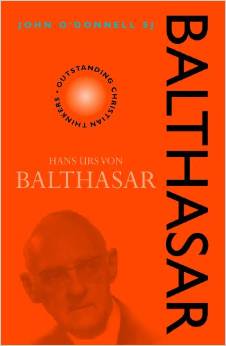
|
Hans Urs von Balthasar: Outstanding Christian Thinkers, by John O'Donnell.
Continuum International Publishing Group; New Ed edition (October 2000)
|
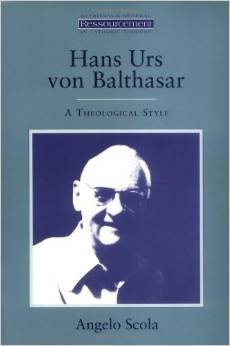
|
Hans Urs Von Balthasar: A Theological Style , by Angelo Cardinal Scola.
Wm. B. Eerdmans Publishing Company (September 1995)
|
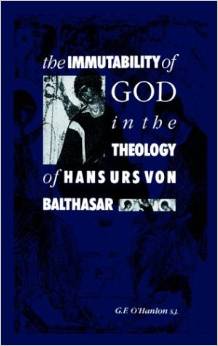
|
The Immutability of God in the Theology of Hans Urs von Balthasarby Gerard F. O'Hanlon.
Cambridge University Press (October 26, 1990)
This study shows how the trinitarian theology of Hans Urs von Balthasar opens up an aproach to the controverted question of God's immutability and impassibility which succeeds in respecting both the transcendence and the immanence of God. Contrary to both Process thought and the classical Thomist position, von Balthasar's scattered treatment is here presented thematically, in a way which makes it clear that his idea of an analogous event in the trinitarian God (in which we participate) is a radical re-interpretation of the traditional Christian axiom of divine immutability.
|
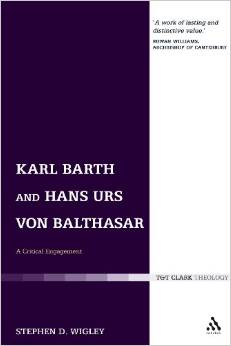
|
Karl Barth and Hans Urs Von Balthasar: A Critical Engagement, by Stephen Wigley.
T. & T. Clark Publishers (September 2007).
|
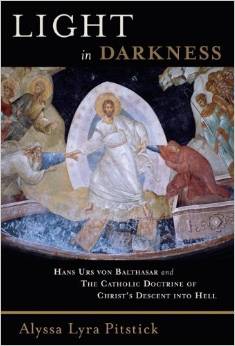
|
Light in Darkness: Hans Urs von Balthasar and the Catholic Doctrine of Christ's Descent into Hell, by Alyssa Lyra Pitstick.
Wm. B. Eerdmans Publishing Company (February 28, 2007)
He descended into hell. Hans Urs von Balthasar, one of the most influential theologians of the twentieth-century, placed this affirmation of the Nicene Creed at the heart of his reflection on the world-altering events of Holy Week, asserting that this identification of God with the human experience is at the "absolute center" of the Christian faith.
Alyssa Lyra Pitstick’s Light in Darkness — the first comprehensive treatment of Balthasar’s theology of Holy Saturday — draws on the multiple yet unified resources of authoritative Catholic thinking on Christ’s descent to challenge Balthasar’s influential conclusions. This carefully argued, contrarian work is sure to spur debate across the theological spectrum. Reviews
|

|
Pattern of Redemption: The Theology of Hans Urs Von Balthasar, by Edward T. Oakes.
Continuum International Publishing Group; New Ed edition (May 1997)
Reviews
-
The Century's Greatest Theologian. Review by Aidan Nichols. CRISIS Magazine, Sept. 1995.
|

|
Person to Person: Friendship and Love in the Life and Theology of Hans Urs Von Balthasar, by John S. Bonnici.
Alba House (July 1999).
|

|
Systematic Thought of Von Balthasar: An Irenaean Retrieval, by Kevin Mongrain.
Herder & Herder (June 25, 2002).
|
|
Towards a Theology of God the Father: Hans Urs von Balthasar's Theodramatic Approach, by Margaret M. Turek.
Peter Lang Publishing (July 2001)
Among Hans Urs von Balthasar's vast corpus of theological works not one is found devoted specifically to an elaboration of a doctrine of God the Father. This study gathers and interprets Balthasar's many scattered reflections on the mystery of the God of Jesus Christ - especially those concentrated in his Theological Dramatic Theory - on its way to constructing an approach towards a theology of God's Fatherhood. Several of the most significant current issues in theology are addressed in this study, such as a reinterpretation of divine omnipotence in terms of the Father's all-powerful powerlessness, the question of the possibility of coexistence between infinite freedom and finite freedom, an understanding of the immutability of God that allows for the Father's being affected in some way by finite freedom, and an account of the Father's generative act that sees as integral to it a properly paternal modality of receptivity.
|

|
Word and Silence: Hans Urs Von Balthasar and the Spiritual Encounter Between East and West, by Raymond Gawronski.
Eerdmans Pub Co (October 1995).
|
|

